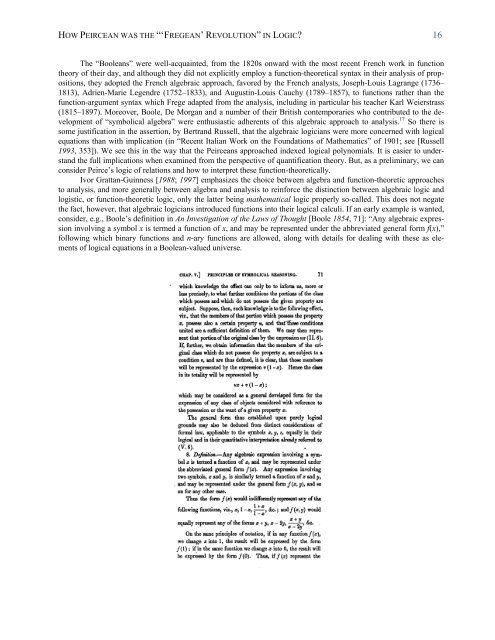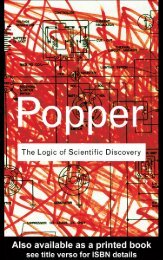HOW PEIRCEAN WAS THE “‘FREGEAN’ REVOLUTION” IN LOGIC? 16 The “Booleans” were well-acquainted, from the 1820s onward with the most recent French work in function theory of their day, and although they did not explicitly employ a function-theoretical syntax in their analysis of propositions, they adopted the French algebraic approach, favored by the French analysts, Joseph-Louis Lagrange (1736– 1813), Adrien-Marie Legendre (1752–1833), and Augustin-Louis Cauchy (1789–1857), to functions rather than the function-argument syntax which Frege adapted from the analysis, including in particular his teacher Karl Weierstrass (1815–1897). Moreover, Boole, De Morgan and a number of their British contemporaries who contributed to the development of “symbolical algebra” were enthusiastic adherents of this algebraic approach to analysis. 17 So there is some justification in the assertion, by Bertrand Russell, that the algebraic logicians were more concerned with logical equations than with implication (in “Recent Italian Work on the Foundations of Mathematics” of 1901; see [Russell 1993, 353]). We see this in the way that the Peirceans approached indexed logical polynomials. It is easier to understand the full implications when examined from the perspective of quantification theory. But, as a preliminary, we can consider Peirce’s logic of relations and how to interpret these function-theoretically. Ivor Grattan-Guinness [1988; 1997] emphasizes the choice between algebra and function-theoretic approaches to analysis, and more generally between algebra and analysis to reinforce the distinction between algebraic logic and logistic, or function-theoretic logic, only the latter being mathematical logic properly so-called. This does not negate the fact, however, that algebraic logicians introduced functions into their logical calculi. If an early example is wanted, consider, e.g., Boole’s definition in An Investigation of the Laws of Thought [Boole 1854, 71]: “Any algebraic expression involving a symbol x is termed a function of x, and may be represented under the abbreviated general form f(x),” following which binary functions and n-ary functions are allowed, along with details for dealing with these as elements of logical equations in a Boolean-valued universe.
HOW PEIRCEAN WAS THE “‘FREGEAN’ REVOLUTION” IN LOGIC? 17 According to van Heijenoort [1967b, 325], Boole left his propositions unanalyzed. What he means is that propositions in Boole are mere truth-values. They are not, and cannot be, analyzed, until quantifiers, functions (or predicate letters), variables, and quantifiers are introduced. Even if we accept this interpretation in connection with Boole’s algebraic logic, it does not apply to Peirce. We see this in the way that the Peirceans approached indexed “logical polynomials. Peirce provides quantifiers, relations, which operate as functions do for Frege, as well as variables and constants, the latter denoted by indexed terms. It is easier to understand the full implications when examined from the perspective of quantification theory. But, as preliminary, we can consider Peirce’s logic of relations and how to interpret these function-theoretically. With respect to Boole, it is correct that he conceived of propositions as adhering to the subject-predicate form and took the copula as an operator of class inclusion, differing from Aristotle only to the extent that the subject and predicate terms represented classes that were bound by no existential import, and might be empty. De Morgan, however, followed Leibniz in treating the copula as a relation rather than as representing a subsistence between an object and a property. Peirce followed De Morgan in this respect, and expanded the role of relations significantly, not merely defining the subsistence or nonsubsistence of a property in an object, but as a defined correlation between terms, such as the relation “father of” or his apparent favorite, “lover of”. Boole, that is to say, followed Aristotle’s emphasis on logic as a logic of classes or terms and their inclusion or noninclusion of elements of one class in another, with the copula taken as an inherence property which entailed existential import, and treated syllogisms algebraically as equations in a logic of terms. Aristotle recognized relations, but relegated them to obscurity, whereas De Morgan undertook to treat the most general form of a syllogism as a sequence of relations and their combinations, and to do so algebraically. De Morgan’s algebraic logic of relations is, thus, the counterpart of Boole’s algebra of classes. We may summarize the crucial distinctions by describing the core of Aristotle’s formal logic as a syllogistic logic, or logic of terms and the propositions and syllogisms of the logic having a subject-predicate syntax, entirely linguistic, the principle connective for which, the copula is the copula of existence, which is metaphysically based and concerns the inherence of a property, whose reference is the predicate, in a subject; Boole’s formal logic as a logic of classes, the terms of which represent classes, and the copula being the copula of class inclusion, expressed algebraically; and De Morgan’s formal logic being a logic of relations whose terms are relata, the copula for which is a relation, expressed algebraically. It is possible to then say that Peirce in his development dealt with each of these logics, Aristotle’s Boole’s, and De Morgan’s, in turn, and arrived at a formal logic which combined, and then went beyond, each of these, by allowing his copula of illation to hold, depending upon context, for terms of syllogisms, classes, and propositions, expanding these to develop (as we shall turn to in considering van Heijenoort’s third condition or characteristic of the “Fregean <strong>revolu</strong>tion”), a quantification theory as well. Nevertheless, Gilbert Ryle (1900–1976) [1957, 9–10] although admittedly acknowledging that the idea of relation and the resulting relational inferences were “made respectable” by De Morgan, but he attributed to Russell their codification by in The Principles of Mathematics—rather than to Peirce—their codification and to Russell—rather than to Peirce and Schröder—their acceptance, again by Russell in the Principles. Again, Ryle [1957, 9–10] wrote: “The potentialities of the xRy relational pattern, as against the overworked s–p pattern, were soon highly esteemed by philosophers, who hoped by means of it to order all sorts of recalitrances in the notions of knowing, believing….” It should be borne in mind, however, that Boole did not explicitly explain how to deal with equations in terms of functions, in his Mathematical Analysis of Logic [Boole 1847], although he there [Boole 1847, 67] speaks of “elective symbols” rather than what we would today term “Boolean functions”, 18 and doing so indirectly rather than explicitly. In dealing with the properies of elective functions, Boole [1847, 60–69] entertains Prop. 5 [Boole 1847, 67] which, Wilfrid Hodges [2010, 34] calls “Boole’s rule” and which, he says, is Boole’s study of the deep syntactic parsing of elective symbols, and which allows us to construct an analytical tree of the structure of elective equations. Thus, for example, where Boole explains that, on considering an equation having the general form a1t1 + a2t2 + … + artr = 0, resolvable into as many equations of the form t = 0 as there are non-vanishing moduli, the most general transformation of that equation is form ��(a1t1 + a2t2 + … + artr) = ��(0), provided is is taken to be of a “perfectly arbitrary character and is permitted to involve new elective symbols of any possible relation to the original elective symbols. What this entails, says Hodges [2010, 4] is that, given ��(x) is a Boolean function of one variable and s and t are Boolean terms, then we can derive ��(s) = ��(s) from s = t, and, moreover, for a complex expression ��(x) = fghjk(x) are obtained by composition, such that fghjk(x) is obtained by applying f to ghjk(x), g to hjk(x), …, j to k(x), in turn, the parsing of which yields the tree





